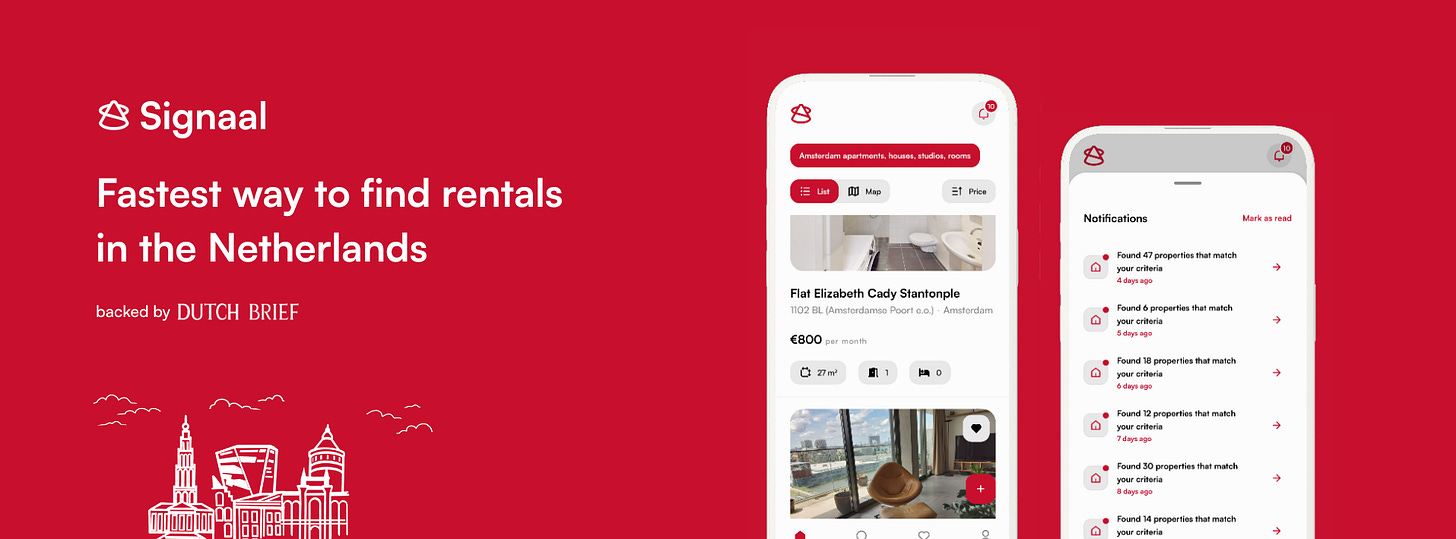Everything About Finding a GP in Groningen
How to register with a huisarts (GP), what to expect at appointments, after-hours care, and what to do if practices are full.
Before we begin, a quick shoutout to our sponsor, Signaal:
Looking for housing in the Netherlands?
Signaal helps you skip the endless scrolling by tracking new listings from trusted platforms and alerting you when something matches your needs, all in one easy-to-use app.
New in Groningen? Registering with a huisarts (GP) should be one of your first admin tasks. Here’s a simple, up-to-date guide: how to sign up, what to bring, how appointments work, where to go after hours, and what to do if every practice says “full.”
How to register with a huisarts
1) Find nearby practices and check availability
Start with your address and search for practices in your neighbourhood. A reliable route is to look up practices on ZorgkaartNederland, then click through to each practice website to see if they’re accepting new patients (“inschrijven”).
2) Prepare the basics practices typically ask for
Most practices will want:
Proof of identity (passport/ID; there’s an identification duty in Dutch healthcare),
BSN (citizen service number) if you have it,
Dutch health insurance details (insurer name & policy number),
Your pharmacy in Groningen (if known), and previous GP details to transfer your record. These are commonly listed on local forms and English pages for Groningen practices and “Healthcare for Internationals.”
No BSN yet? You can still ask to register; many forms say “BSN (if available)”. If you’ll be here under 4 months, you can request a BSN via the municipality’s RNI desk.
3) Submit the registration form
Many Groningen practices let you register online or by emailing a PDF form; some will invite you for a quick intake and ID check before completing your registration. Catchment areas apply—some practices only accept certain postcodes, so don’t be surprised if they check your address.
4) Transfer your medical record
Ask your old GP to forward your medisch dossier to the new one. Standard guidance is to transfer (preferably digitally, with your permission) and to do so promptly once you switch. You can also request a copy for yourself.
5) If you’re uninsured yet
You can still be seen, but practices may ask you to pay at the desk then claim later once insured (some Groningen practice pages state this explicitly).
What to expect at appointments (Dutch GP basics)
Triage & access: You usually call the assistant in the morning for same-day or near-term slots. Simple issues may be handled by telephone or e-consult. Home visits are possible when medically necessary.
Consult length: Standard consultations are ~10–20 minutes. If you have multiple issues, say so when booking so they can schedule extra time.
Referrals & prescriptions: The GP is your first contact and the gatekeeper for referrals to hospitals/specialists. Repeat prescriptions are commonly arranged via your practice portal or pharmacy.
Where to find reliable self-help info: For trustworthy guidance in Dutch and English, use Thuisarts.nl and GPinfo.nl (English version).
After-hours & urgent care in Groningen
Outside office hours (17:00–08:00), weekends and public holidays, call the Huisartsenpost (GP emergency service) first—do not walk in. In Groningen this is Doktersdienst Groningen, Van Swietenlaan 2b (near Martini Hospital). The central number is 0900-9229. Their site is clear: call if it truly can’t wait until your own GP; in life-threatening situations, call 112.
Self-triage tools linked by the Huisartsenpost (e.g., moetiknaardedokter.nl, Thuisarts) can help you decide whether you need urgent care now or your own GP later.
“Every practice says they’re full”—what to do
You’re not imagining it: GP access is under pressure nationwide. The Netherlands Court of Audit reported that about 60% of practices stopped accepting new patients in 2024, and shortages may grow; thousands were actively searching for a GP as of late 2024.
Here’s a pragmatic plan:
Look Further
Email or call several practices within a reasonable cycle/bus radius; explain you’re not registered anywhere yet and live within their postcode area. If one says “no,” ask politely whether they know a nearby practice with space or a waitlist. Many Groningen practices publish status updates (e.g., “temporarily no new patients” or “waitlist”).Ask your health insurer to mediate (wachtlijstbemiddeling)
All Dutch insurers provide mediation when you cannot register with a GP in your town. Start with your insurer’s “wachtlijstbemiddeling” page or call the care coaches.Try academic or student-friendly practices
The Academic GP Practice at UMCG periodically accepts new patients and has information in English (entrance 47, UMCG). Check their page for current status and how to register.Know when a refusal is allowed
Free choice applies in principle, but a GP may refuse if the practice is full or you live too far away. If you feel you’re refused without good reason, contact your insurer or Adviespunt Zorgbelang for support.
Registering early saves stress later. Gather your documents, try several practices near your address, lean on your insurer if needed, and use the Huisartsenpost after hours. Once you’re in the system, day-to-day care in Groningen is straightforward.




